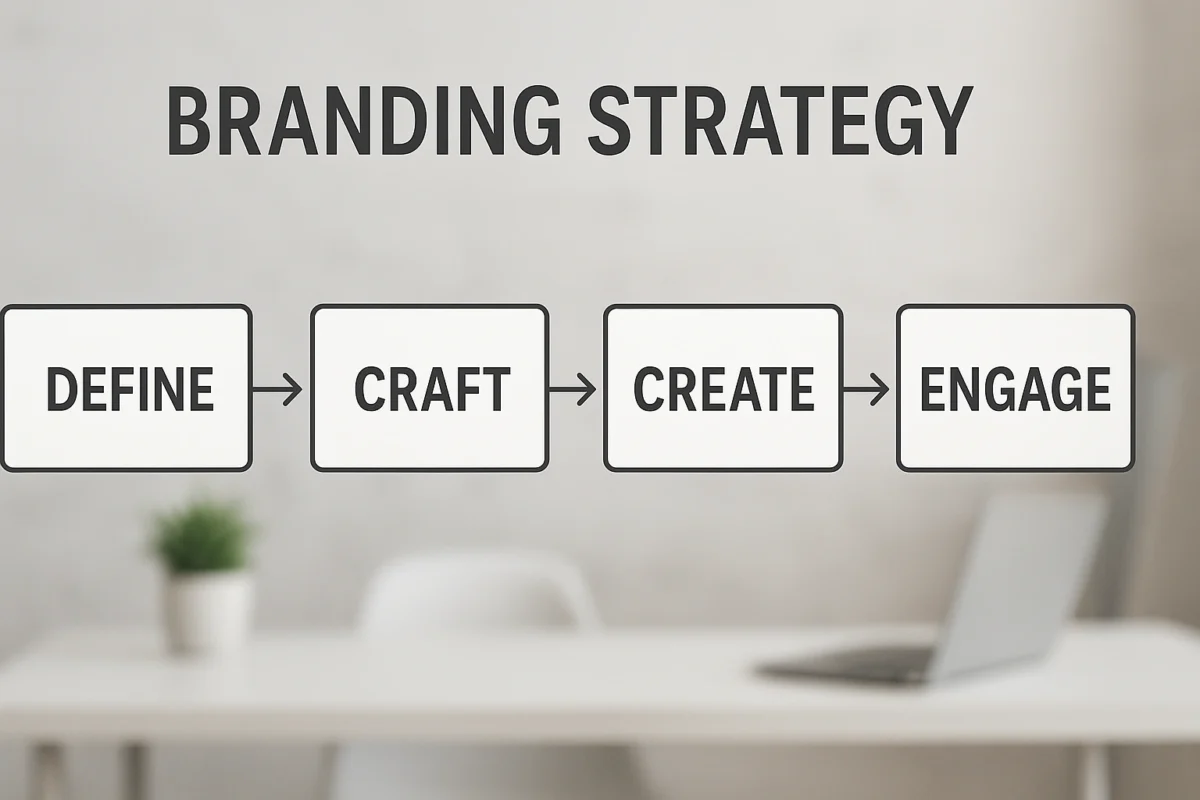- In the Digital Age, You’re a Brand Whether You Like It or Not
- What is a Personal Brand?
- Why a Strong Personal Brand is Your Greatest Career Asset
- The 4-Step Framework for Building Your Brand
- Choosing Your Primary Branding Platform
- Common Personal Branding Mistakes to Avoid
- Expert Tips for a Standout Brand
- Frequently Asked Questions
- Define Your Brand, or Others Will Define It for You
In the Digital Age, You’re a Brand Whether You Like It or Not
What do people find when they search your name online? In a world where your digital footprint often precedes your physical handshake, that question is more critical than ever. Whether you’re actively managing it or not, you already have a personal brand. The only question is whether it’s the one you want.
Leaving your professional reputation to chance is one of the biggest career mistakes you can make in 2025. This guide is designed to empower you to take control. We’ll provide a step-by-step framework to help you define, build, and grow a powerful **Personal Brand**. You’ll learn the strategies to articulate your value, build credibility, and attract opportunities, no matter your industry.
What is a Personal Brand?
A personal brand is the unique combination of skills, experience, and personality that you want the world to see. It’s the story people tell about you when you’re not in the room. It’s your professional reputation, deliberately cultivated and communicated to a target audience. It’s about showcasing your expertise and what makes you, you.
In the past, branding was reserved for companies. Today, it’s an essential tool for individual career management. As Jeff Bezos famously said, “Your brand is what other people say about you when you’re not in the room.” In the digital world, that “room” is global and always on. A strong **Professional Branding** strategy is no longer an option for the ambitious; it’s a necessity.

Why a Strong Personal Brand is Your Greatest Career Asset
Investing in your personal brand is investing in your future success.
Build Trust and Credibility
By consistently sharing your knowledge and insights, you establish yourself as an expert in your field. This builds trust with your audience, whether they are potential employers, clients, or collaborators. A strong brand makes you the go-to person in your niche.
Attract Opportunities Instead of Chasing Them
A powerful personal brand acts like a magnet for opportunities. Recruiters will find you, clients will seek you out, and conference organizers will invite you to speak. You shift from actively hunting for your next role to having opportunities come directly to you.
Differentiate Yourself in a Crowded Market
Your resume lists your skills, but your brand tells your story. It showcases your unique perspective, your values, and your personality. This differentiation is what makes you memorable and helps you stand out from a sea of qualified candidates. For more career-building resources, sites like InfoinAja can offer valuable information.
The 4-Step Framework for Building Your Brand
Building a brand is a strategic process. Follow these four steps.
- 1. Define Your Brand Foundation: You can’t build a strong house on a weak foundation. Start by defining your “three Ps”: Purpose (why you do what you do), Passion (what you love to do), and Position (who you do it for). This clarity is the bedrock of an authentic brand.
- 2. Craft Your Brand Identity: This is how you express your foundation. It includes your visual identity (headshot, color palette) and your verbal identity (your elevator pitch, your bio, the tone of voice you use in your writing).
- 3. Create and Curate Content: Your content is how you demonstrate your expertise. This doesn’t mean you have to write a blog. It can be curating interesting industry articles on LinkedIn, sharing a visual portfolio on Instagram, or answering questions on Quora. The key is to consistently provide value to your target audience.
- 4. Engage and Build Your Network: A brand is built in conversation, not in a vacuum. Actively engage with others in your field. Comment on their posts, participate in discussions, and offer help. Building genuine relationships is the most powerful part of professional branding.

Choosing Your Primary Branding Platform
You don’t need to be everywhere. Choose one or two platforms and master them.
| Platform | Best For | Pros | Cons |
|---|---|---|---|
| All professionals, especially B2B. | The definitive professional network, powerful for networking and job seeking. | Can feel formal; requires a high level of professionalism. | |
| Twitter (X) | Tech, journalism, academia, creative fields. | Real-time conversations, direct access to industry leaders. | Fast-paced and can be noisy; requires consistent engagement. |
| Personal Blog/Website | Thought leaders, freelancers, consultants. | You own the platform and control the narrative completely; great for SEO. | Requires significant effort to build an audience. |
| Instagram/TikTok | Visual-heavy industries (design, fashion, food, fitness). | Highly engaging visual formats, can build a large following quickly. | Less focused on traditional professional networking. |
Common Personal Branding Mistakes to Avoid
Building a brand is a marathon. Avoid these common stumbles.
- Being Inconsistent: Using a different headshot, bio, and tone of voice across different platforms confuses your audience. Consistency builds recognition and trust.
- Trying to Be Someone You’re Not: Authenticity is the cornerstone of a strong brand. Don’t try to project an image of an expert you’re not. Be honest about your journey and share what you’re learning.
- Broadcasting, Not Engaging: Don’t just post your own content and log off. Spend more time commenting, sharing, and engaging with others than you do creating your own posts.
- Ignoring Your Offline Brand: Your personal brand extends to your real-world interactions. Be professional, helpful, and kind in every interaction, whether it’s online or in person.
Expert Tips for a Standout Brand
“Your personal brand isn’t about being famous; it’s about being known for something specific. Find the niche where your passion and the market’s needs intersect. It’s better to be a big fish in a small pond than a small fish in the ocean.”
— Mark Schaefer, Marketing Strategist and Author
- Conduct a “Personal Brand Audit”: Google yourself in an incognito window. What comes up? Does it reflect the brand you want to project?
- Ask for Feedback: Ask trusted colleagues or a mentor, “What are the first three words that come to mind when you think of me professionally?” This can provide invaluable insight.
- Create a “Content Pillar”: Choose one core topic you want to be known for. Create one major piece of content about it (like a detailed blog post or a video), then break it down into dozens of smaller posts for social media.
Frequently Asked Questions
Q: How is a personal brand different from a resume?
A: A resume is a historical document that lists your skills and experiences. A personal brand is a living, breathing reputation that tells the story behind those facts. It communicates your values, your passion, and your unique perspective, giving context and personality to your qualifications.
Q: Do I need a personal brand if I’m not an entrepreneur or freelancer?
A: Absolutely. In today’s competitive job market, a strong personal brand is a key differentiator for any professional. It helps you stand out for internal promotions, attract opportunities from other companies, and establish yourself as an expert within your industry.
Q: How long does it take to build a personal brand?
A: Building a strong, authentic personal brand is a marathon, not a sprint. While you can establish the foundations in a few months, it’s a lifelong process of continuous learning, sharing, and engaging. Consistency is more important than intensity.
Define Your Brand, or Others Will Define It for You
In the digital age, having a **Personal Brand** is not a matter of choice. The only choice is whether you will be an active architect of your own reputation or a passive bystander. By taking a strategic approach to your **Professional Branding**, you are making a powerful investment in your long-term career success.
Use this guide to start your journey. Define your value, share your expertise, and build genuine connections. Your future career will be built on the foundation of the brand you start building today.
